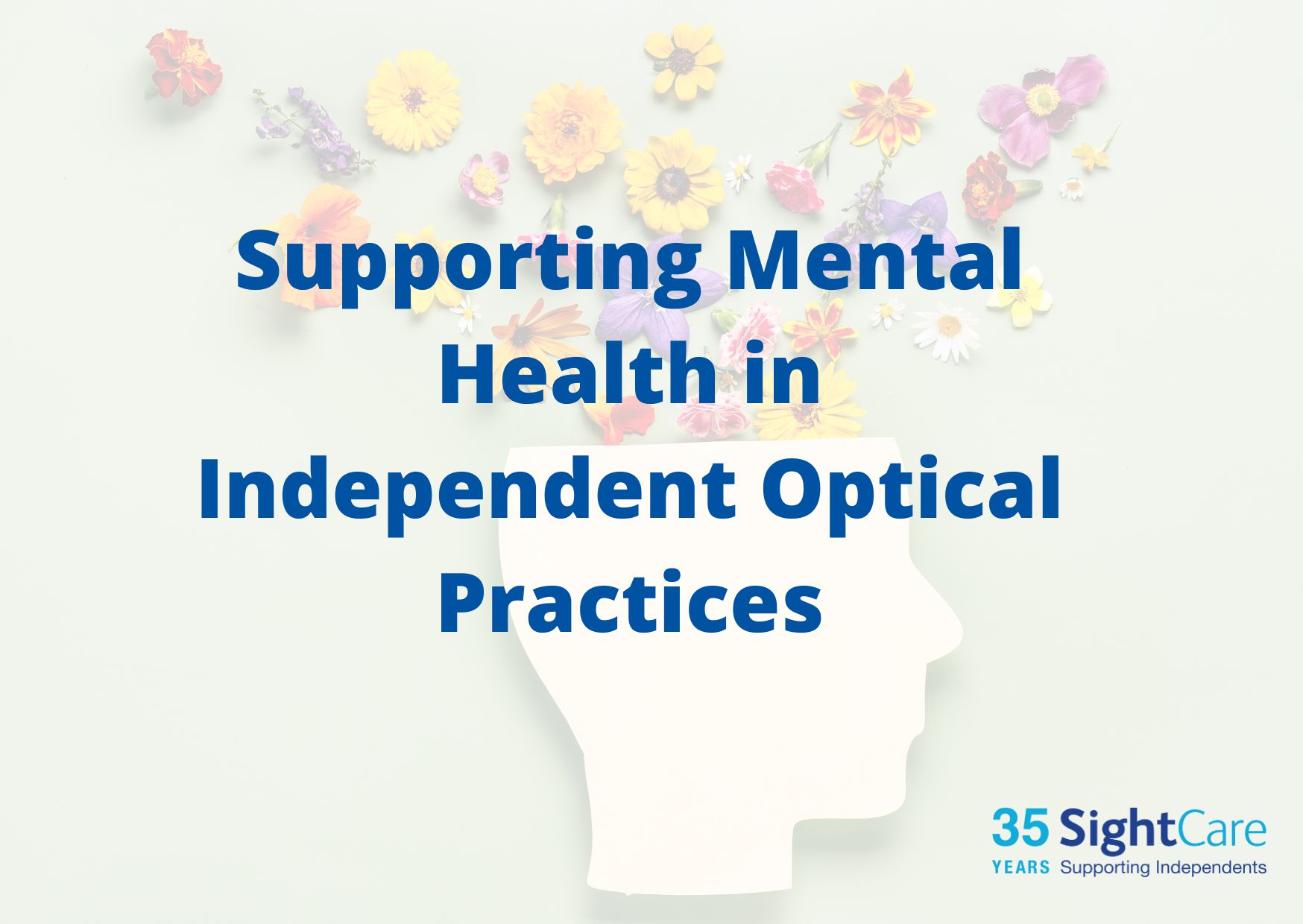Supporting Mental Health in Independent Optical Practices
As World Mental Health Day approaches on 10 October, it’s important to reflect on the well-being of not just our patients but also ourselves and our teams. Independent optical practices, while rewarding, can be high-pressure environments. Balancing patient care, business management, and personal responsibilities can sometimes take a toll on mental health. This World Mental Health Day, let’s focus on creating a healthier workplace culture for you, your staff, and your patients.
Here are some practical tips for enhancing mental health within your practice:
Encourage Open Communication
Mental health thrives in environments where people feel safe and supported. As an optical practice owner, create an open-door policy where staff can express their concerns, whether personal or work-related. Consider these steps:
– Regular Check-ins: Schedule regular one-on-one meetings to discuss workload, stress levels, and any challenges.
– Confidential Conversations: Ensure that staff feel comfortable talking about sensitive issues without fear of judgment or repercussions. Ensure you are able to provide a confidential space they can speak to you in without others overhearing.
– Anonymous Feedback: Offer anonymous suggestion boxes or surveys to gather honest feedback on workplace stressors.
Foster a Positive Work-Life Balance
Managing a busy optical practice can lead to long hours and burnout. Encourage your team to maintain a healthy work-life balance:
– Flexible Schedules: Flexibility is ranked highly as something that helps to create a happy workforce – can you accommodate personal needs to help?
– Delegate Responsibilities: Train staff members to handle key tasks, so no one feels overwhelmed, and so they feel that they can take annual leave without worrying. Share responsibilities to avoid overburdening any one person.
– Encourage Breaks: Promote regular breaks throughout the day. Even short 5-minute breaks can reduce stress and improve focus, especially for optometrists who perform detailed eye exams, but also for receptionoists who may find looking at a screen for long periods of time can leave them feeling tired.
Promote Physical Well-being
Physical health plays a significant role in mental health, and the two are closely connected. Encourage habits that promote both:
– Ergonomic Workspaces: Ensure that opticians and staff have ergonomic setups to reduce physical strain, especially when working with equipment or computers.
– Encourage Movement: Encourage staff to stand, stretch, and move around between appointments. Even simple stretches can help release tension and improve mood.
– Hydration: Keep water easily accessible in the practice.
Educate and Raise Awareness
Provide training to help staff recognise the signs of mental health struggles in themselves and their colleagues. Education can break down stigmas and empower people to seek help:
– Mental Health Workshops: Consider hosting mental health awareness workshops or inviting guest speakers to talk about coping strategies and wellness in the workplace.
– Mental Health First Aid: Train your team in Mental Health First Aid so they can recognise signs of distress and offer support when needed.
Lead by Example
As a practice owner, your behaviour sets the tone for the entire team. Demonstrating a commitment to mental health can encourage others to do the same:
– Self-care: Show that it’s okay to take time for self-care, whether that’s taking time off, delegating tasks,leaving on time or simply taking breaks. Sometimes workers will feel nervous to leave at their designated end of work time if they see you always staying behind later than you should.
– Work Boundaries: Be mindful of your work boundaries and avoid sending non-urgent emails after hours to encourage a true work-life separation.
– Utilise SightCare’s Business Support Groups: Find people who understand your challenges and can offer insightful advice.
Offer Mental Health Resources
Providing access to mental health support can make a significant difference in the lives of your staff:
– Employee Assistance Programs (EAPs): Consider offering an EAP, which provides confidential counseling and support services for staff.
– Local Mental Health Resources: Share information about local therapists, support groups, or helplines. Make sure your team knows where to turn if they need professional help.
– Wellness Apps: Recommend mindfulness apps, such as Headspace or Calm, that can help employees manage stress and anxiety during busy times.
7. Create a Supportive Environment for Patients
Mental health isn’t just important for your staff—your patients may also be struggling. Ensure your practice is a welcoming space:
– Patient Communication: Be mindful of how you and your staff communicate with patients, especially those with eye conditions that can affect their quality of life.
– Compassionate Care: Offering compassionate and patient-centered care can make a world of difference to someone dealing with the anxiety of vision problems or treatment uncertainty.
– Signposting: Have leaflets or websites to hand for patients who need extra help or support.
8. Celebrate Wins Together
Mental health can be significantly improved by cultivating a culture of celebration and positivity:
– Recognise Accomplishments: Whether it’s a positive patient review, hitting a business milestone, or simply finishing a busy day, take time to celebrate together. SightCare has an annual award ceremony which is perfect for this.
– Team-building Activities: Plan team-building activities or social gatherings outside of work to foster relationships and encourage a sense of community, or shut for a day so the staff don’t have to give up their personal time with family.
Creating a positive, supportive environment will not only enhance your practice’s success but also improve the quality of life for everyone involved. This World Mental Health Day, let’s take the opportunity to prioritise mental health and well-being in our practices, not just for one day, but throughout the year.
By taking these small but significant steps, we can ensure that everyone – from practice owners to staff and patients – benefits from a healthier, more supportive workplace.

